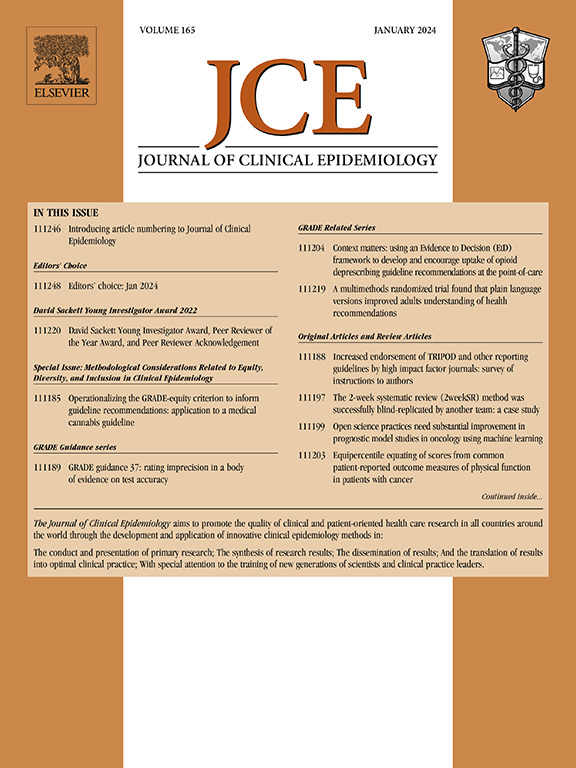临床流行病学的关键概念:生物医学研究数据的标准化。
IF 5.2
2区 医学
Q1 HEALTH CARE SCIENCES & SERVICES
引用次数: 0
摘要
FAIR指导原则促进数据的可查找性、可访问性、互操作性和重用,以加强数据管理和管理。在生物医学领域,特殊的伦理、法律和技术障碍使研究数据共享复杂化。为了帮助研究人员克服这些挑战,我们从科学、技术和法律/伦理三个维度提出了一个公平化的框架。我们提倡对研究数据进行前瞻性的标准化,从一开始就强调数据共享的规划。整个过程中的反思性问题引导研究人员反思他们的处境。研究人员应该评估资源和可行性,确保技术和法律支持,考虑利益相关者的需求,并设计适当的数据共享过程。鉴于生物医学数据的敏感性,保密性和安全性需要仔细注意。数据共享策略应在研究开始前确定,并记录在相关研究材料中。数据共享的技术准备遵循计划。数据应该用数据字典和元数据进行良好的文档记录,以方便重用,并以可访问的格式提供。数据可以托管在存储库上,以促进共享和重用。虽然安全存储库为数据保护提供了技术基础,但需要有效的管理来执行数据使用协议和许可。我们还讨论了数据上传后后续管理的重要性。对研究人员和数据维护的持续支持对于有效重用至关重要。包括促进公平化的示例和资源,以帮助研究人员应对挑战,并确保生物医学数据公平和可重复使用。本文章由计算机程序翻译,如有差异,请以英文原文为准。
Key concepts in clinical epidemiology: FAIRification of biomedical research data
The Findable, Accessible, Interoperable, and Reusable guiding principles promote Findability, Accessibility, Interoperability, and Reuse of data to enhance data management and stewardship. In biomedicine, particular ethical, legal, and technical barriers complicate research data sharing. To help researchers overcome these challenges, we propose a framework of FAIRification from three dimensions – scientific, technical, and legal/ethical. We advocate for prospective FAIRification of study data, starting with a strong emphasis on planning for data-sharing from the beginning. Reflective questions throughout the process guide researchers to reflect on their situation. Researchers should assess resources and feasibility, secure technical and legal support, consider stakeholder needs, and devise an appropriate data sharing process. Given the sensitivity of biomedical data, confidentiality and security require careful attention. The data sharing strategy should be finalized before the study starts and documented in relevant study materials. Technical preparation for data sharing follows planning. Data should be well-documented with a data dictionary and metadata to facilitate reuse and provided in an accessible format. The data can be hosted on a repository to promote sharing and reuse. While a secure repository provides the technical foundation for data protection, effective administration is required to enforce data use agreements and licensing. We also discuss the importance of subsequent management upon data upload. Continued support for researchers and data maintenance are essential for effective reuse. Examples and resources to facilitate FAIRification are included to help researchers navigate challenges and ensure biomedical data are FAIR and reusable.
求助全文
通过发布文献求助,成功后即可免费获取论文全文。
去求助
来源期刊

Journal of Clinical Epidemiology
医学-公共卫生、环境卫生与职业卫生
CiteScore
12.00
自引率
6.90%
发文量
320
审稿时长
44 days
期刊介绍:
The Journal of Clinical Epidemiology strives to enhance the quality of clinical and patient-oriented healthcare research by advancing and applying innovative methods in conducting, presenting, synthesizing, disseminating, and translating research results into optimal clinical practice. Special emphasis is placed on training new generations of scientists and clinical practice leaders.
 求助内容:
求助内容: 应助结果提醒方式:
应助结果提醒方式:


